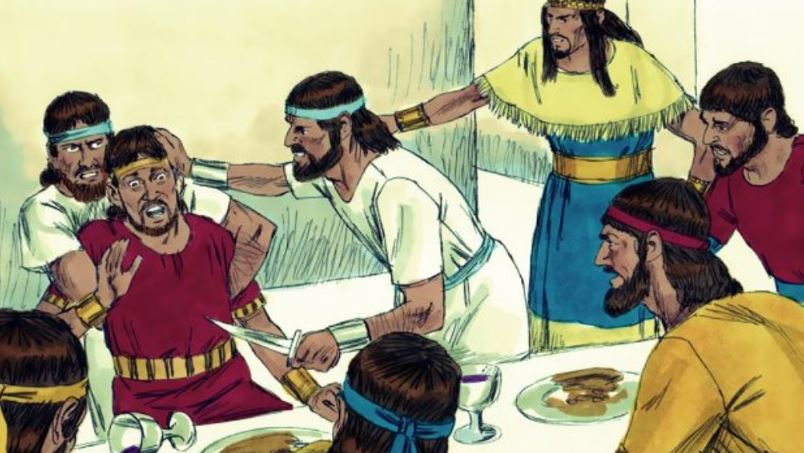Amnon is a complex and tragic character found in the Bible, specifically in the Old Testament book of 2 Samuel, chapter 13. As the eldest son of King David, Amnon’s story is marked by intense emotions, moral failings, and violent actions that reveal the dysfunction and discord within David’s family. His actions, particularly the assault on his half-sister Tamar, had far-reaching consequences not only for his immediate family but also for the stability of David’s reign and the kingdom of Israel as a whole. Understanding Amnon’s story offers insights into issues of unchecked desire, justice, and the repercussions of King David’s own choices, all of which contribute to the larger narrative of the Davidic dynasty’s turmoil and moral challenges.
Background of Amnon
Amnon’s Lineage and Role
Amnon was the firstborn son of King David and Ahinoam, which placed him in a position of prominence as the likely successor to the throne. In ancient Israel, the eldest son typically inherited the father’s authority and legacy, and Amnon, as David’s firstborn, held this expectation. His privileged status, however, was overshadowed by his actions and personality traits that ultimately led to his downfall. Descriptions in biblical texts and interpretations often portray Amnon as impulsive and prone to destructive passions, which set the stage for the tragic events that unfolded within his family.
The Story of Amnon and Tamar
Amnon’s Obsession with Tamar
Amnon’s story becomes especially notable with his intense fixation on his half-sister, Tamar. His feelings were less about genuine affection and more about an unhealthy obsession, driven by uncontrolled lust. The object of his desire, Tamar, was known for her beauty and virtue, and as his obsession grew, Amnon found himself unable to act rationally. Amnon confided in his friend and cousin Jonadab, a cunning advisor who suggested a scheme that would ultimately lead to disastrous consequences.

The Deceptive Plan and the Assault
Following Jonadab’s advice, Amnon pretended to be ill, knowing it would prompt Tamar to visit and care for him as a dutiful sister. Amnon’s deception worked; Tamar arrived to tend to him, only to find herself alone and vulnerable. When Amnon attempted to seduce her, Tamar resisted, pleading for him to consider the moral and familial disgrace such an act would bring. Despite her objections, Amnon forced himself on Tamar, committing a grave sin that would haunt his family and forever alter Tamar’s life.
Aftermath and Amnon’s Rejection of Tamar
After the assault, Amnon’s obsession with Tamar abruptly turned to contempt. He rejected her harshly, ordering her to leave, which added to Tamar’s emotional trauma and social disgrace. Tamar was left devastated, forced to live in shame within her brother Absalom’s household. Amnon’s actions led to a rift in David’s family, stirring deep resentment in Absalom, Tamar’s full brother, who would eventually seek revenge for the dishonor brought upon his sister. This event set off a tragic chain reaction of violence and retribution that would impact David’s family and the future of his kingdom.
Consequences of Amnon’s Actions
Absalom’s Revenge
As Tamar’s full brother, Absalom was deeply angered by Amnon’s actions and immediately took his distraught sister into his home. He provided her with refuge and comfort, though his anger toward Amnon simmered quietly. Instead of confronting Amnon directly or publicly condemning him, Absalom allowed his rage to build, planning his revenge with patience. For two years, he harbored this resentment, waiting for the right moment to exact justice for Tamar’s humiliation and suffering. Finally, at a family gathering under the guise of a festive sheep-shearing event, Absalom seized his opportunity. He instructed his servants to kill Amnon when he was off guard, ensuring that his sister’s assailant paid the ultimate price for his actions. This act of revenge sent shockwaves through the family and further fractured the unity of David’s household, sowing seeds of future discord and rebellion.
David’s Inaction and Family Strife
Upon learning of Amnon’s assault on Tamar, King David was furious, yet he took no substantial action to punish his son. Scholars suggest multiple reasons for David’s apparent inaction. One possible reason is David’s guilt over his own moral failings, particularly his affair with Bathsheba, which had led to the murder of her husband, Uriah. David might have felt morally compromised and unqualified to pass judgment on Amnon for a crime that mirrored his own indiscretions. Another factor could have been a lack of witnesses, as Amnon’s friend Jonadab had orchestrated the assault to avoid exposure, making it difficult for David to take legal action under Jewish law at the time.
David’s choice not to punish Amnon had long-term repercussions for his family. Absalom’s violent response to Amnon’s crime and David’s hesitance to address it openly began a cycle of family strife and vengeance. This chain of events eventually led to Absalom’s rebellion against David, threatening the stability of David’s kingdom and marking a period of intense familial discord and political instability. The rift created by Amnon’s actions and David’s passive response would continue to affect David’s legacy and serve as a cautionary tale about the need for accountability and justice.
Themes and Lessons from Amnon’s Story
The Impact of Sin and Unchecked Desire
Amnon’s story embodies the dangers of unchecked desire and the corrosive effects of lust and power when left uncontrolled. His intense fixation on Tamar, rooted more in lust than genuine affection, reveals how unrestrained desires can cloud judgment, harm others, and ultimately lead to personal downfall. Amnon’s lack of restraint and sense of entitlement, especially as the king’s son, underscored a misuse of power within David’s household.
This incident also ties into the broader narrative of David’s life and the ramifications of his own transgressions. After David’s affair with Bathsheba and the orchestrated killing of her husband, Nathan the prophet foretold that David’s family would suffer from similar internal strife. Amnon’s actions and the subsequent conflict with Absalom are part of this prophecy’s fulfillment, demonstrating the ripple effects of sin across generations. This tragic sequence highlights the Bible’s recurring theme of moral accountability, suggesting that actions driven by lust or pride rarely remain isolated, often affecting those closest to us.
The Cost of Injustice and Parental Inaction
Another theme that stands out in Amnon’s story is the destructive power of injustice and parental inaction. King David’s failure to respond decisively to Amnon’s assault on Tamar illustrates the dangers of ignoring wrongdoing within one’s family. David’s apparent passivity, possibly stemming from guilt over his own sins or a desire to protect his firstborn, ultimately fueled resentment and set the stage for Absalom’s revenge. David’s lack of intervention allowed the family’s wounds to fester rather than heal, leading to a cycle of vengeance and violence that destabilized his entire household and kingdom.
This narrative underscores the importance of accountability and justice in maintaining family harmony and societal order. When justice is disregarded or delayed, it often fosters resentment, creating a pathway to greater conflict. David’s inaction serves as a cautionary example, showing that leaders, parents, and guardians have a responsibility to address wrongdoing to prevent further harm. For modern readers, Amnon’s story prompts reflection on the necessity of confronting uncomfortable truths and the potential consequences of allowing justice to be undermined.
Conclusion
Amnon’s story in the Bible holds a significant place within the narrative of King David’s family, presenting a cautionary tale about desire, justice, and familial responsibility. The tragic events surrounding Amnon and Tamar illustrate how unchecked desires and failures to uphold justice can lead to long-term familial and social strife. By examining David’s response—or lack thereof—to Amnon’s actions, we see the potential consequences of inaction and the importance of holding even those we love accountable.
This ancient narrative resonates with modern discussions on family dynamics, justice, and morality, highlighting timeless lessons about the responsibilities of power and the need for moral courage. In studying Amnon’s story, we are reminded of the value of confronting wrongdoing and the peace that accountability can bring to relationships. Ultimately, this story encourages us to apply these lessons today, fostering environments of respect, justice, and responsibility.
1. Who was Amnon in the Bible?
Amnon was the eldest son of King David and Ahinoam, making him the first in line for the throne in ancient Israel. He is best known for his actions in 2 Samuel 13, where he assaulted his half-sister Tamar. This event had significant consequences for King David’s family, leading to a series of conflicts and tragedies.
2. Why did Amnon assault Tamar?
Amnon became infatuated with his half-sister Tamar, and his obsession turned into an uncontrollable desire. Encouraged by his friend Jonadab, Amnon devised a plan to be alone with Tamar, which ultimately led to the assault. His actions were driven by unchecked lust and misuse of his power as a prince.
3. What was King David’s reaction to Amnon’s actions?
David was deeply angered by Amnon’s assault on Tamar, but he took no significant action to punish him. Some interpretations suggest David’s own moral failings, particularly his affair with Bathsheba, may have contributed to his hesitation. David’s inaction allowed unresolved tensions within his family to grow, leading to tragic consequences.
4. How did Absalom respond to Amnon’s actions?
Absalom, Tamar’s full brother, was outraged by Amnon’s treatment of Tamar and sought revenge. He waited two years before enacting his plan, ultimately having Amnon killed at a family gathering. This act of vengeance set off further strife within David’s family and was a turning point in Absalom’s relationship with his father.
5. What themes are present in the story of Amnon and Tamar?
Key themes include the dangers of unchecked desire, misuse of power, and the consequences of injustice. The story also highlights the importance of accountability, as David’s failure to punish Amnon led to further family discord. This narrative is often seen as a warning about the effects of unchecked wrongdoing and the need for moral responsibility.
6. How does the story of Amnon connect to King David’s own sins?
The incident with Amnon can be seen as part of the prophecy given by Nathan after David’s affair with Bathsheba, indicating that David’s family would face turmoil as a consequence. The familial strife following Amnon’s actions and David’s inaction reflects this prophecy and serves as a reminder of the ripple effects of moral failings.
7. What can we learn from the story of Amnon?
The story teaches the importance of addressing wrongdoing and holding individuals accountable, especially within families. It serves as a cautionary tale about the dangers of ignoring justice, the impact of sin, and the long-term effects of failing to take decisive action against immoral behavior.
8. How does Amnon’s story relate to modern discussions on justice and accountability?
Amnon’s story provides timeless lessons on the importance of confronting wrong actions and ensuring justice, even when it involves loved ones. It reflects the potential damage caused by unresolved conflicts and the need for moral courage in addressing difficult situations, making it relevant in discussions of family dynamics, justice, and morality today.
